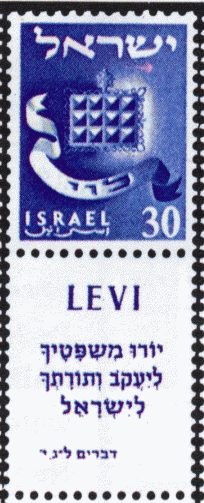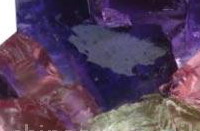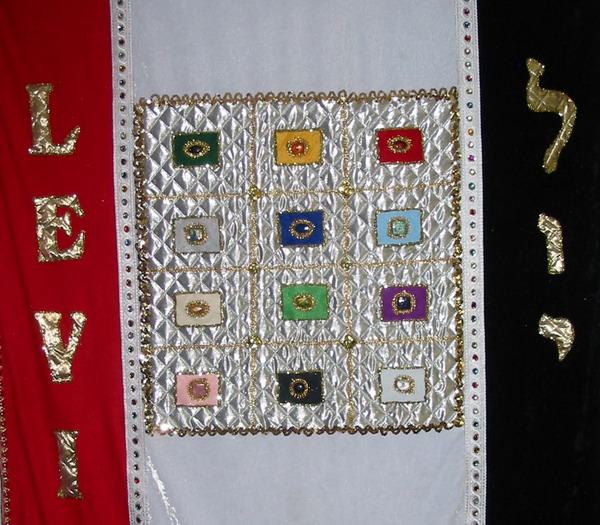Levi
Tribal Characteristics in a Nutshell
Levi
Levi was the third son. His stone was a crystal like substance, called a baraket which literally means "a flashing stone".
His mother was Leah.
It was prophesied that Levi would teach the Law and be a party to deciding what exactly the Law was (Deuteronomy 33:10).
Moses was from the Tribe of Levi.
For more see below.
|

|

|
Levi
Note: All observations below are based on sources BUT it could be claimed
that in some instances we have read too
much into them. Unlike most of the other Tribes we know real people with
definite traditions that they are Cohens or
Levites so it is with some trepidation that the following notes have been
written. When dealing with "real" people it is difficult to make generalizations
since there will always be exceptions. There often will also be those who are
liable to be offended by negative points that really are not correct.
Levi is referred to as the brother of Simeon emphasizing the similarity between
them.
There are similarities between Levi and Simeon.
Under the heading of Levi we may number three sub-categories:
a. Cohens
b. Levites
c. Sons of Moses and Recabites
a. Cohens
Cohens descend from Aharon brother of Moses. They were the priests who
offered sacrifices in the Temple
and who received special obligatory offerings of their own from agricultural
produce, from many of the sacrifices,
and from every animal that was ritually slaughtered for eating even when no
sacrifice was involved.
Cohens are part of the Tribe of Levi but have attributes of their
own.
Today they are very numerous and perhaps number more than Levites in general.
In many Jewish communities it was accepted that Cohens and Levites
did not always necessarily get on with each other and considered bad luck for
them to intermarry.
These days very few still hold stock with such inhibitions.
Cohens may be small in stature even midgets but on the
whole they seem to be taller than
the average. The High Priest according to a Midrash was preferably someone who
was tall and handsome.
The work in the Temple of the Cohens actually required quite a degree of
physical strength and stamina.
They had (amongst other things) to run up a steep ramp carrying big
chunks of meat that could weigh almost as much as themselves!
The Cohens could not touch a dead person but had to have some
medical and scientific knowledge to discern between natural phenomenon and
super-natural ones.
Cohens often have a scientific, analytical nature alongside anatomical and
medical interests.
They have a tendency to be intellectual but not necessarily original.
Cohens are often sensitive and delicate in their approach yet they had a
reputation for irascibility and shorness of temper.
Cohens are compassionate but tend to value social stratification
which can be mistaken for snobbery.
Cohens are of a higher status. They are family minded and lineage
conscious.
Cohens cannot marry a divorced woman or woman convert.
They are not loners. Cohens are community orientated. They belong to groups
whether of other cohens or of whoever belongs to the mainstream community.
Cohens have a tendency to be calm, authoritative, but not necessarily
enterprising.
Cohens are often proud to be cohens and often proud in general but not
excessively so.
They also have the gift of reconciliation and of bringing contesting parties
together
or of finding the right niche for the disgruntled they come in contact with.
These are very rough generalities and numerous exceptions may doubtlessly be
quoted.
Elijah according to tradition was a Cohen though he came from the territory of
Gad and combines attributes of both the Cohens and Gad. He exemplifies another
aspect of their character, that of spiritual depth, mystical elevation,
fanatical dedication, and even what we would call a tendency to eccentricity.
b. Levites
What applies to Cohens also pertains to Levis but less so.
Levites tend to go by the rules. They want things done as they are supposed to
be even if the
main goal that the rules are made for is not achieved as a result.
Bureaucratic personalities sometimes turn out to be Levites. Like Simeon they
have a tendency to violence
and law enforcement being found in the Police Force, security workers, and
judiciary. They can be legalistic.
Levites were often educators. Levites are responsible and sometimes neurotic.
They may tend to worry too much. Formality is important for them.
Levis have the gift of formulation and analysis and drawing practical
conclusions despite their
over-duly rule-abiding constrictions.
Cohens and Levites may be independently employed but prefer regularity,
governmental positions,
and secure arrangements.
One may well find criminals with the names Cohen and Levi but on
the whole they are honest and proper in their dealings.
The Levites served in the Temple as Gate-Keepers, Guards, singers in the choir,
and the players of musical instruments.
They were therefore probably musically talented and shared whatever subsidiary
characteristics are associated with
music, e.g. precision, sensitivity, appreciation of harmony and rhythm, empathy,
emotionally open, etc.
Musical talent is sometimes associated with mathematical ability.
Music is both an art and a science though it relies much on intuition.
[Incidentally some British Israel writers suggested that the Welsh
were Levites based on the legendary musical proclivities of the Welsh. This
seems doubtful to us. Walk into a music store and compare the quantity offered
under Irish Music to that under Welsh or Scottish.]
The Levites and Cohens were not obliged to go out to war like the
other Israelite tribes were. Nevertheless they did not lack discipline nor
physical courage. The Hasmonean Maccabees were cohens. With a handful of
guerillas they defeated what in their time was a major world power and created a
little Empire of their own.
Sons of Moses and
Rechabites
Sons of Moses and Rechabites are a category of people of
non-Israelite origin who attached themselves to Israel
or Judah. They are often associated with the Sons of Moses and with the Lost Ten
Tribes.
They sometimes take on the characteristics of Levites but emphasize spiritual
and moral considerations
more than legalistic ones. They may be considered non-Israelites who were
destined from the beginning
of creation to belong to Israel but were born outside in order to absorb certain
attributes
the nation had need of.
For more details on the Tribes see under the heading:
Tribes and Israelite Tribal Identifications
Home



